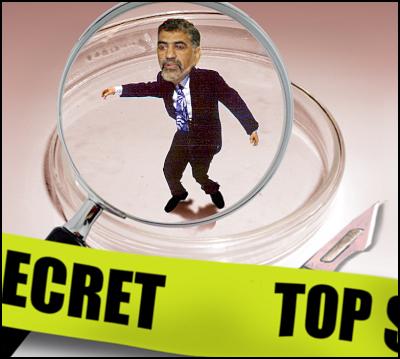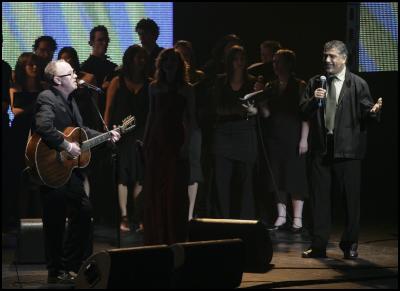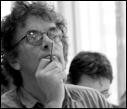Gordon Campbell: The Aftermath In Europe
Gordon Campbell series on Zaoui: The aftermath in Europe.

To the critics of
Ahmed Zaoui, his convictions in Europe are a knock-down
argument. The man has been convicted in Belgium and France -
and that’s the end of it. The fact that the Refugee Status
Appeals Authority analysed the dubious methods by which the
convictions were gained, and the weight that should be given
to the convictions – as they were compelled to do when
assessing whether Zaoui qualified for refugee status –
have been seen as very bad form. A retired judge such as the
SIS Inspector-General Paul Neazor one imagines, would be
bound to feel disquiet about the RSAA’s discounting of
those convictions.
Somewhat surprisingly, there has been little or no attention given to the subsequent fate of Zaoui’s co-defendants. If Zaoui’s convictions in Europe were so serious then surely, his co-defendants must also be under lock and key in the dungeons of Europe, right?
Because Europe after all, is where the offences took place. Think of the Madrid rail bombings, the tube bombings in London. If they are not – if most of the co-conspirators are actually living freely in Europe, and have been granted residency there…doesn’t that seriously weaken the case for treating Zaoui as a threat to faraway New Zealand?
From the outset, I have to confess that I don’t have the resources to track down every last one of Zaoui’s co-defendants, in Belgium and France. What I’d like to suggest though is that this would be a worthwhile project for any media organization out there willing to take on the job. Love to help, guys.
What we could start with is the fact that none of the co-conspirators in France ( Ali Ammar, Zaoui, Sellam, Beddiaf, Boujadaar, Djeffal, Kraouche and Haddam ) were sentenced to serve time behind bars in this case. As is well known, the French prosecutions were mounted many years after the facts alleged - and three of the defendants ( Sellam, Ali Ammar, and Zaoui ) were convicted in absentia. Tellingly, France never sought to extradite any of them. That fact may say everything we need to know about how France views the offences.
As one reads the RSAA judgement, it is equally striking that France issued only suspended sentences – virtually a ‘don’t do this again, or we’ll make you serve the time’ response. In France, Zaoui was convicted of having false passports - not unknown for a political exile sentenced to death back home - and with participating in an association with criminals, with an intent to prepare a terrorist act. Zaoui never even knew he was being charged with this offence– let alone was ever given the chance to defend himself against the allegations. In its decision the Refugee Status Appeals Authority commented that "As to the French judgment, we were struck by the minimal evidence relied on to convict the appellant" and it went on to state at para 867 : “We conclude that the appellant's French convictions are unsafe and are not probative or reliable evidence of the appellant's involvement in a criminal association with intent to prepare acts of terrorism.” Zaoui got a three year suspended sentence in France.
In New Zealand however, he actually served two years in jail ( with 10 months in solitary confinement) and has since served two and a half further years detained on bail. Without ever having been charged. The courts at least, have noticed how strange this is. During the bail hearings in the Court of Appeal in 2004 for instance, Justice Hammond commented that Zaoui, while never charged, had actually served the equivalent time in jail of someone handed down a five year sentence for something like robbery with violence !
This disproportionate reaction by New Zealand – thousands of kilometres away from the offence – compared to the response by France, is an indictment of how seriously the SIS have miscalculated the danger Zaoui is thought to pose. I can’t say how many of his co-defendants are now free and living in Europe, but I wouldn’t mind betting that most will have residency somewhere in Europe by now.
Lets start with what we do know. One person had the original charges against him dismissed, as having no case to answer. This was the exiled FIS politician Anwar Haddam, a self confessed former member of the GIA - who is now living in the United States. Kraouche, against whom the charges were dismissed - due to the police planting evidence – is now said to be living in Europe as a permanent resident of either France, or Spain.
Ali Ammar ( who, like Zaoui, got a three year suspended sentence) was last heard of living either in Sweden, Norway or the Netherlands. In coming months I will be asking the former TVNZ reporter Alex Van Wel – who followed the Zaoui story to Algeria and Europe – to see if he can update the situation with respect to the other Zaoui co-defendants.
Moving onto the Belgian convictions. The co-defendants here were Abdelli, Maaroufi, Boudriah, Zaoui, Moulay, Ouallah, Kassoul, Feers, Nasr, Benkrifa, El Majda and El Majda Ali. The last seven were acquitted. Zaoui, once again, got a suspended – don’t do it again or else – type of sentence.
Far from being a GIA hardliner, Zaoui seems to have helped turn them in. Back when the RSAA report first came out in 2003, it was always an interesting aside that at paragraph 635, Zaoui is said to have tipped off the police that Abdelli and Boudriah were GIA members - a claim he later withdrew, after being threatened. These are hardly the actions of a stoic GIA hardliner.
The Belgian charge against Zaoui was of him being ‘the head of the association of criminals’ and two passport charges. Again, he received a suspended sentence, this time of four years. The RSAA concluded [ para 752] that the Belgian convictions were unsafe, and did not constitute reliable evidence of the appellant's involvement in acts of terrorism or any other non-political crimes.
I have no idea how many of the co-defendants in Belgium are now living freely in Europe – but even a basically resourced media investigation would be able to track them down. Think about it. How can it possibly be, as the SIS alleges, that letting Zaoui stay here would be damaging to New Zealand’s international reputation – when Anwar Haddam, a confessed former GIA member, is living freely and working in the United States?
The sad reality is that Zaoui’s case has been pursued in a vacuum here. A stereotype of the Islamic fundamentalist threat has been conjured up by the SIS, and the “ facts” about Zaoui have been tailored to fit it - with no respect for context, and only after ignoring the wealth of contradictory evidence.
This of course, is the task that the Zaoui lawyers will face during the first few weeks of the review. On one level, it is virtually impossible to DISPROVE that Zaoui was not secretly a GIA member to people hell-bent on making that assertion. How do you disprove that you weren’t in secret, a member of an underground organization? For the SIS though, it is really simple - because Zaoui has been so inexplicably helpful to them.
Their claim is that Zaoui confessed to being GIA on his arrival at Auckland airport. As Tharron McIvor laconically noted in his Master of Laws dissertation on refugee protection in New Zealand, this would make Zaoui perhaps the only person on record who has ever admitted to being a terrorist to Customs staff ! I’m a terrorist – now let me stay in your country. Yeah right.
In the face of such nonsense, the defence team have only one form of counter attack – a steady, incremental piling up of fact. Patiently they have to put on the table an alternative narrative of Zaoui’s life and ideals - and trust that over the coming months, their narrative will seem more thorough and credible to the Inspector-General than the one that the SIS has been touting.
I tried to trace a possible beginning for that narrative last week. One can point to the Algerian social theorist Malek Bennabi, and his lasting influence on the University of Algiers grouping within the FIS - a faction to which Zaoui was close, while being less politically active.
Bennabi’s modernising fusion of Islam and democracy stood in opposition both to the secular neo-Marxist nationalism of the FLN and to the Salafist fundamentalists of the pan-Islamic revival. It is a vision that Zaoui has always espoused, and is a worldview marked by respect for minorities, for religious tolerance and gender equality.
It is that same vision of tolerance that saw Zaoui invited by the Catholic community of San Egidio in Rome in 1994 to be one of the co-organisers of the so called ‘Rome Platform’conference that tried in vain to find a compromise solution to the Algerian civil war. Which in turn, may explain why Zaoui has lived peacefully with the Catholic friars for the past two and a half years. These are not the living conditions a Salafist jihadi preacher would tolerate for a moment.

Nor does the larger pattern of Zaoui’s life in Auckland fit the jihadi stereotype, either. An Islamic fundamentalist would not tolerate having Deborah Manning, a young Western woman, as his lawyer and chief adviser. When walking down Lorne St on the first day of the review, Zaoui had another Western woman, Sarah Cooper, as his minder. To the sceptical of course, these are not knockdown arguments and nor are they meant to be. Yes, we all know how convincingly the 9/11 bombers fitted into Western society.
What it does go to support though, is a pattern. A pattern that shows there is very little in Zaoui’s life and actions that fit the jihadi stereotype, and much that contradicts it.
Will such realities mean very much to Neazor in the end ? Maybe not. Unfortunately – and this is one of the real drawbacks of the way his post is structured and resourced - Neazor’s entry into the world of Islamic politics in Algeria was almost certainly managed by the-then SIS Director Richard Woods. The SIS were essentially writing on a blank slate – in a situation where Neazor had no independent staff or resources to help him to sift out the fact from the fantasy in what he was being told.
To be sure, Neazor will bring his judicial mind to the task at hand. Even so, his post is set up in a way that is chronically vulnerable to capture by the SIS. So much so that it may be very difficult indeed for any narrative that comes along in the wake of the SIS version - they’re the experts, right? - to get a foothold, much less real traction. All that the Zaoui defence team can do is to pile up the detail of Zaoui’s life and beliefs on the table. Tactically, the Zaoui lawyers should therefore be intent on giving Neazor a long and searching look at Zaoui himself during the coming weeks.
Zaoui was on the witness stand at the RSAA after all, for eleven whole days. Such long exposure proved a key reason why the RSAA panel became convinced of the merits of his case. In the coming weeks, the more that Neazor gets to see and question Zaoui face to face, the more chance he will give the alternative narrative of Zaoui’s life the weight that it deserves.
Next: The special advocates take over the reins
 Disclosure : Gordon Campbell now
works as a media officer for the Green Party. He has been
writing about the Ahmed Zaoui case since
2003.
Disclosure : Gordon Campbell now
works as a media officer for the Green Party. He has been
writing about the Ahmed Zaoui case since
2003.


 Richard S. Ehrlich: Cyber-Spying 'From Lhasa To London' & Tibet Flexing
Richard S. Ehrlich: Cyber-Spying 'From Lhasa To London' & Tibet Flexing Gordon Campbell: On Aussie Election Aftershocks And Life Lessons
Gordon Campbell: On Aussie Election Aftershocks And Life Lessons Martin LeFevre - Meditations: Regarding Popes, Dopes And Hopes
Martin LeFevre - Meditations: Regarding Popes, Dopes And Hopes Binoy Kampmark: Fantasy And Exploitation | The US-Ukraine Minerals Deal
Binoy Kampmark: Fantasy And Exploitation | The US-Ukraine Minerals Deal Gordon Campbell: On The Aussie Election Finale
Gordon Campbell: On The Aussie Election Finale Martin LeFevre - Meditations: The Enlightenment Is Dead; What Is True Enlightenment?
Martin LeFevre - Meditations: The Enlightenment Is Dead; What Is True Enlightenment?